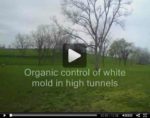Showing 1-1 of 1 results

Organic Control of White Mold in High Tunnels
The fungus Sclerotinia sclerotiorum infects many of the cool-season crops produced in Kentucky. This SARE-funded video presents information on the high tunnel production system most commonly used in Kentucky; the disease cycle of S. sclerotiorum; and two control tactics compatible with national organic standards, solarization and biofumigation.